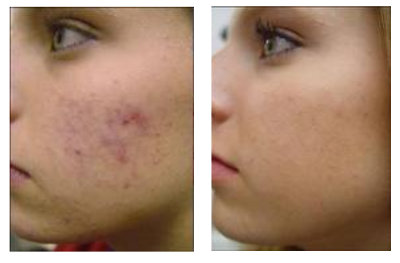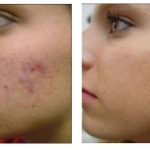
Chemical peels are effective not only in treating superficial acne scars, but also effective in the treatment of stubborn comedonal acne.

Chemical peels, also known as chemo-exfoliation or derma-peeling, decrease the depth of medium depth acne scars, though the peelings have to be repeated at regular intervals to achieve the desired results.
Mechanism of Action of Chemical Peels in Getting Rid of Acne Scars
Chemical agents used as chemical peels remove the skin layers depending upon the strengths used. Depending upon the strength and depth of the peeling effects, the chemical peels are divided into superficial, medium depth and deep peels.
Removal of the varying depth of skin layers results in regeneration of fresh crops of rejuvenated skin cells from underneath the basal layer of the skin. Medium depth and deep chemical peelings stimulate new collagen and elastic tissue formation in the dermal layer of the skin and help to fill in the deficits and depressions caused by most acne scars. The overall effect will be straightening out of the depressed, atrophic scars and fresh, healthy skin surface.
Common Agents Used as Chemical Peels in Acne
The common agents used for chemical peeling in acne are:
Trichlor Acetic Acid (TCA): 10-70%
Glycolic acid: 20-70%
Phenol: 88%
Pyruvic Acid 60%
Salicylic acid 10-20%
Lactic acid 10-20%
Tretinoin 0.05%
Resorcinol: 15%
Except the trichlor acetic acid and phenol, all other peeling agents are available on prescription and/or as OTC products. TCA and phenol peeling are best carried out by a trained dermatologist, as maintaining the optimum strength and time of contact is important in achieving the desired effects and also in avoiding untoward accidents and adverse effects.
Indications for Use of Chemical Peels in Acne
Chemical peels are best used to get rid of superficial, soft atrophic acne scars. For people who would not or cannot go for the costly alternatives in deep scars, repeated peeling will help reduce the depth and visibility of the scars. Chemical peels are also effective in treating comedones and dark blemishes caused by inflamed acne.
Limitations and Adverse Effects of Chemical Peels in Acne
Chemical peels are not very effective in treating deep ice pick scars and thick hypertrophic scars. Other limitations of chemical peels include the following:
If stronger preparations are used or kept on the skin for longer durations than necessary, extensive burning and further scarring may result from chemical exfoliant usage. Skin of some patients is very sensitive and may get burnt with even lower concentrations of the peeling agents, especially TCA and phenol. Hence a small test area is treated first to see the effects before the whole face is tackled.
Those who are about to get their face peeled should avoid using topical retinoids at least two to three days before and systemic isotretinoin at least two weeks before.
The skin will become sensitive to sun following chemical peeling; for obvious reasons. A high SPF(50 or more) sunscreen cream should be applied before venturing outdoors for at least two weeks after the chemical peeling is performed. Direct sun-exposure is best avoided for the first two to three days after the procedure.
Post-inflammatory pigmentation is a dreaded complication of chemical peels in persons with dark skin. This can be avoided if the skin is primed for the peeling with the use of a combination of sunscreens during daytime and depigmenting creams like hydroquinone and tretinoin at night for a period of four to six weeks prior to the chemical peel. Topical tretinoin should be stopped 2-3 days before the procedure as discussed above.
Though with its own risks, chemical peeling is a useful therapeutic option for superficial acne scars, and is a safe procedure in the hands of well trained, experienced dermatologists and cosmetologists.
Acne Scar Removal with Chemical Peels: Related Articles
Acne Scar Treatment: Management of the Scarring Caused by Pimples. Acne scar treatment depends upon the depth and extent of scarring and the type of the pimple scars.
Medical Treatment of Acne Scars : Non-surgical Management of Acne Scar. Medical or conservative treatment is suitable for superficial or shallow acne scars and acne skin blemishes.
Acne Scar Surgical Treatment: Cosmetic Acne Scars Removal. There are a number of effective surgical and cosmetic treatment options for acne scar removal.

